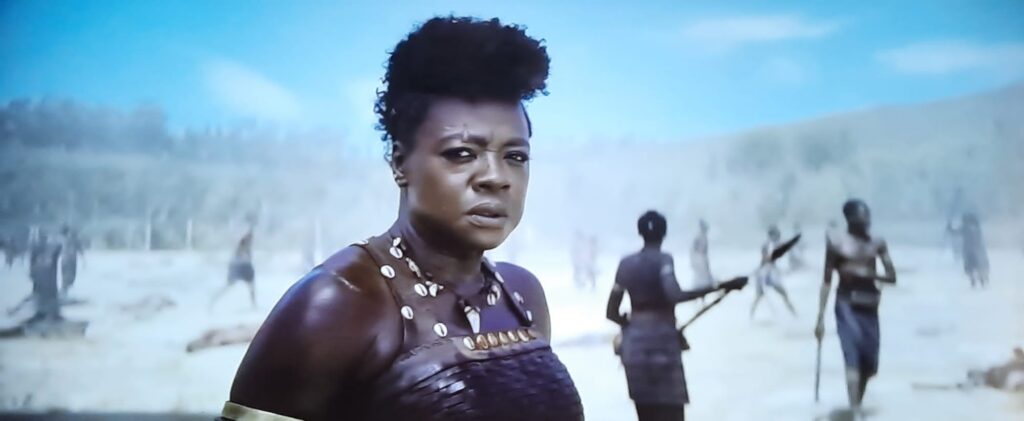Staring Viola Davis (winner of an Academy Award, Emmy Award and two Tony Awards), The Woman King already got my vote.
Everything the actress does is worth watching, and this was no different.
The film centres around the Agojie, the real-life all-woman military regiment.
The female army protected the Kingdom of Dahomey, now southern Benin, from 1600 until 1894 when the kingdom became a French protectorate.
The plot
We follow the main character, Nanisca (Viola Davis), the General of the Agojie, as she trains and leads her fearsome army.
Her battles earn her the respect of the King, who considers her his most trusted advisor.
Soon, a young woman, Nawi, is brought to the Agojie by her father. She’s to become one of them after refusing to marry a much older man.
Through Nawi’s journey as a recruit, we learn what it takes to be an Agojie.
Their rigorous training includes how to outwit enemies and decapitate a head in one swoop.
As we discover, the risk of an Agojie being held captive is death, or worse, a lifetime of sexual enslavement.
The human elements
The film is not all fight scenes and battlegrounds.
It’s also a very human story about the respect these women gain, but at a cost.
To become an Agojie means not being able to get married or see their family.
They’re entirely devoted to protecting their kingdom. Away from everyone else, they become each other’s family.
They build motherly and sisterly bonds and make huge sacrifices, some of which come back to haunt them.
In the backdrop, the film explores other human cost themes: the rise of slavery in West Africa and the beginnings of colonialism.
Hollywood not history
The storyline was criticised for its lack of historical accuracy.
It portrays the Kingdom of Dahomey as wanting to end slavery when endorsing slavery was what helped it become one of the most powerful African states at the time.
King Ghezo (played by John Boyega) is seen as empathetic when history tells us he was likely to be a tyrant, as most leaders of that period were, to preserve their power.
You’ll be fine if you can appreciate the film for what it is, trying to tell the lesser-known story of the Agojie to a wider audience while blurring some historical details.

A photo of the real-life Agojie.
Women warriors, not glam squads
What was refreshing was the film’s raw portrayal of these female warriors. You see their battle wounds and scars and what they had to endure when going head-to-head in battle with men.
In contrast to Hollywood’s depiction of women warriors such as Wonder Woman or Xena, The Warrior Princess, it isn’t about being Amazon glam, wearing sexy costumes or perfectly blow-dried hair.
It shows these women as fierce fighters and not frivolous eye candy.

Lieutenant Izogie of the Agojie army (played by Lashana Lynch) holds a pain endurance contest with a male counterpart.
Decades in the making
The film had been an idea for decades.
The release of The Black Panther franchise (whose all-female regiment was inspired by the Agojie) and public demand for more diversity on screen finally led to The Woman King being made.
Behind the scenes, the production team was similarly made up of a predominantly female ensemble.
At the helm, were executive producers Maria Bello (Giant Little Ones), Cathy Schulman (Crash) and Viola Davis and her husband Julius Tennon (The Simone Biles Story).
Other ranks included screenwriter Dana Stevens (City of Angels), and director Gina Prince-Bythewood (Love & Basketball and The Secret Life of Bees).

An executive producer and star of the film, Viola Davis played a fictional character in the Agojie army. She took on one of her most physically demanding roles at the age of 50.
British talent
The outstanding cast was mostly close to home. Five out of seven of the main characters were British.
This included Lashana Lynch (who is fantastic as an Agojie role model and lieutenant), Sheila Atim (also incredible as an Agojie leader and confidant), John Boyega (as the candid King) and Hero Fiennes Tiffin and Jordan Bolger (as the Portuguese slave traders).
With the film being shot in South Africa, it is wonderful to see their local talent also in the spotlight.
Thuso Mbedu plays the brilliantly rebellious Nawi and Masali Baduza depicts her meek best friend.
The Woman King is a beautifully told story of fight, recognition and devotion to a cause.
The Woman King played in UK cinemas until October 2023. It is now available to watch on Sky, Amazon Prime and Now TV.
